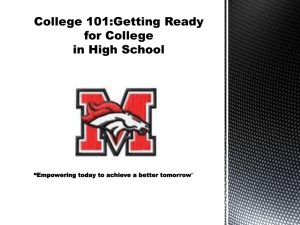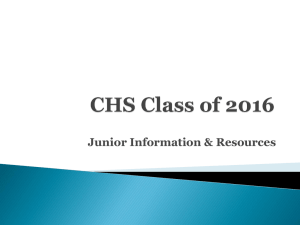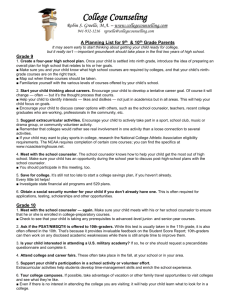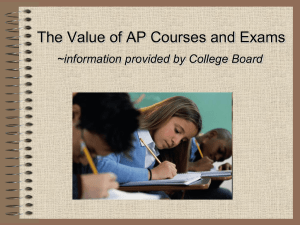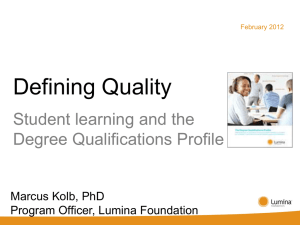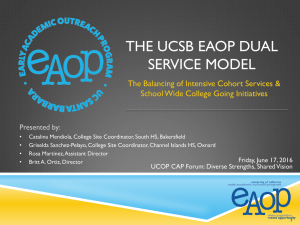Middle School College Prep Checklist
advertisement
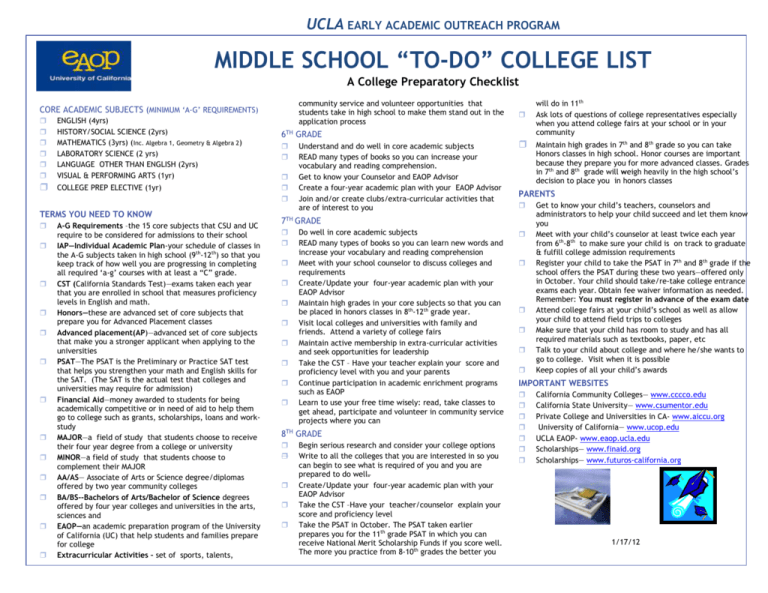
UCLA EARLY ACADEMIC OUTREACH PROGRAM MIDDLE SCHOOL “TO-DO” COLLEGE LIST A College Preparatory Checklist community service and volunteer opportunities that students take in high school to make them stand out in the application process CORE ACADEMIC SUBJECTS (MINIMUM ‘A-G’ REQUIREMENTS) ENGLISH (4yrs) HISTORY/SOCIAL SCIENCE (2yrs) MATHEMATICS (3yrs) (Inc. Algebra 1, Geometry & Algebra 2) LABORATORY SCIENCE (2 yrs) LANGUAGE OTHER THAN ENGLISH (2yrs) VISUAL & PERFORMING ARTS (1yr) COLLEGE PREP ELECTIVE (1yr) TERMS YOU NEED TO KNOW A-G Requirements –the 15 core subjects that CSU and UC require to be considered for admissions to their school IAP—Individual Academic Plan-your schedule of classes in the A-G subjects taken in high school (9th-12th) so that you keep track of how well you are progressing in completing all required ‘a-g’ courses with at least a “C” grade. CST (California Standards Test)—exams taken each year that you are enrolled in school that measures proficiency levels in English and math. Honors—these are advanced set of core subjects that prepare you for Advanced Placement classes Advanced placement(AP)—advanced set of core subjects that make you a stronger applicant when applying to the universities PSAT—The PSAT is the Preliminary or Practice SAT test that helps you strengthen your math and English skills for the SAT. (The SAT is the actual test that colleges and universities may require for admission) Financial Aid—money awarded to students for being academically competitive or in need of aid to help them go to college such as grants, scholarships, loans and workstudy MAJOR—a field of study that students choose to receive their four year degree from a college or university MINOR—a field of study that students choose to complement their MAJOR AA/AS— Associate of Arts or Science degree/diplomas offered by two year community colleges BA/BS--Bachelors of Arts/Bachelor of Science degrees offered by four year colleges and universities in the arts, sciences and EAOP—an academic preparation program of the University of California (UC) that help students and families prepare for college Extracurricular Activities – set of sports, talents, 6TH GRADE Understand and do well in core academic subjects READ many types of books so you can increase your vocabulary and reading comprehension. Get to know your Counselor and EAOP Advisor Create a four-year academic plan with your EAOP Advisor Join and/or create clubs/extra-curricular activities that are of interest to you Maintain high grades in 7th and 8th grade so you can take Honors classes in high school. Honor courses are important because they prepare you for more advanced classes. Grades in 7th and 8th grade will weigh heavily in the high school’s decision to place you in honors classes PARENTS 7TH GRADE Do well in core academic subjects READ many types of books so you can learn new words and increase your vocabulary and reading comprehension Meet with your school counselor to discuss colleges and requirements Create/Update your four-year academic plan with your EAOP Advisor Maintain high grades in your core subjects so that you can be placed in honors classes in 8th-12th grade year. Visit local colleges and universities with family and friends. Attend a variety of college fairs Maintain active membership in extra-curricular activities and seek opportunities for leadership Take the CST – Have your teacher explain your score and proficiency level with you and your parents Continue participation in academic enrichment programs such as EAOP Learn to use your free time wisely: read, take classes to get ahead, participate and volunteer in community service projects where you can 8TH GRADE Begin serious research and consider your college options Write to all the colleges that you are interested in so you can begin to see what is required of you and you are prepared to do well. Create/Update your four-year academic plan with your EAOP Advisor Take the CST –Have your teacher/counselor explain your score and proficiency level Take the PSAT in October. The PSAT taken earlier prepares you for the 11th grade PSAT in which you can receive National Merit Scholarship Funds if you score well. The more you practice from 8-10th grades the better you will do in 11th Ask lots of questions of college representatives especially when you attend college fairs at your school or in your community Get to know your child’s teachers, counselors and administrators to help your child succeed and let them know you Meet with your child’s counselor at least twice each year from 6th-8th to make sure your child is on track to graduate & fulfill college admission requirements Register your child to take the PSAT in 7th and 8th grade if the school offers the PSAT during these two years—offered only in October. Your child should take/re-take college entrance exams each year. Obtain fee waiver information as needed. Remember: You must register in advance of the exam date Attend college fairs at your child’s school as well as allow your child to attend field trips to colleges Make sure that your child has room to study and has all required materials such as textbooks, paper, etc Talk to your child about college and where he/she wants to go to college. Visit when it is possible Keep copies of all your child’s awards IMPORTANT WEBSITES California Community Colleges— www.cccco.edu California State University— www.csumentor.edu Private College and Universities in CA- www.aiccu.org University of California— www.ucop.edu UCLA EAOP- www.eaop.ucla.edu Scholarships— www.finaid.org Scholarships— www.futuros-california.org 1/17/12

